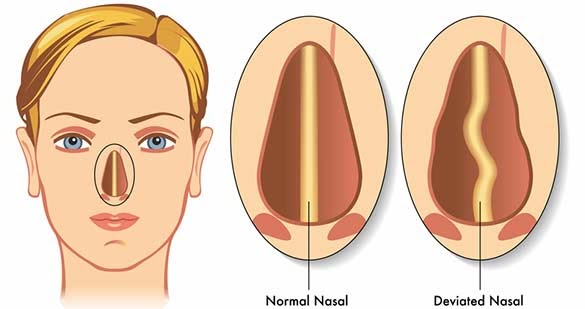Sinus disease is one of the most common chronic medical conditions facing Americans today. It causes our healthcare system billions of dollars in direct and indirect costs and results in millions of lost days from work and school. These diseases include sinus infections and tumors that may or may not be benign.
The sinuses have a relatively poor blood supply, making it more difficult for medicine and white blood cells to get to the sinuses to treat infections. That’s why you need a sinus expert to diagnose your condition and provide the best treatment for fast relief. At NY Allergy & Sinus Centers, our specialists have extensive knowledge and experience in treating sinus conditions.
Sinus Infections and Other Conditions
Acute Sinusitis
Acute sinusitis is short-term inflammation of the sinuses lasting up to 4 weeks. This sinus infection is either allergic or non-allergic. Allergic acute sinusitis develops when allergies are left untreated and cause the nasal passages and sinuses to swell. We recommend treating your allergies with allergy shots to prevent allergic acute sinusitis.
Non-allergic acute sinusitis is most commonly due to a cold-causing viral infection. However, up to one-third of patients have bacterial sinusitis. Acute sinusitis is much more common in adults than it is in children, whose sinuses are not fully developed.
Chronic Sinusitis
Chronic sinusitis is long-term inflammation of the sinuses lasting longer than 12 weeks. It may be caused by an ongoing infection or growth in the sinuses. Allergies, nasal polyps, and respiratory tract infections can also cause chronic sinusitis. You may have several episodes of acute sinusitis before developing chronic sinusitis. Serious complications of chronic sinusitis are rare but include vision problems and serious infections of the bones or skin. Contact one of our specialists for immediate treatment for chronic sinusitis.
Nasal Obstruction
Nasal obstruction is anytime airflow in the nose is impeded because of a blockage of the nasal cavity. It is also called nasal blockage. Nasal obstruction may result from:
- Deviated septum
- Enlarged adenoids
- Nasal polyps
- Turbinate bones
A deviated septum is a condition in which the nasal septum — the bone and cartilage that divide the nasal cavity of the nose in half — is significantly off-center or crooked. It can cause difficulty in breathing.

Adenoids are a patch of tissue that is high up in the throat, just behind the nose. Adenoids trap germs that enter the body. Adenoid tissue becomes enlarged as it tries to fight an infection resulting in nasal obstruction. Allergies also can make them get bigger.
Nasal turbinates are structures located inside the nose, along the sides of the nasal cavities. They are made of bone and are covered by a soft tissue known as “mucosa.” Allergies or other nasal problems can cause the turbinates to swell and block airflow.
This is also true of nasal polyps, soft, noncancerous growths on the lining of your nasal passages or sinuses. In most cases, nasal polyps can be treated with corticosteroids or other medications. However, some patients may need surgery to remove the polyps. Schedule a consultation at NY Allergy & Sinus Centers to determine your treatment plan.
Nasal and Sinus Tumors
Nasal and sinus tumors are benign or cancerous growths that occur in the nose or sinuses. They are rare, with only about 2,000 diagnosed in the U.S. each year. Noncancerous tumors in the sinuses do not spread but may cause damage if not treated. You will need an ENT (ear, nose, and throat) specialist to diagnose and treat nasal and sinus tumors.
Frontal Paranasal Sinus Mucocele
Frontal paranasal sinus mucocele present as cystic masses with mucus. This sinus condition results from obstruction of the sinus ostia that helps drain mucus. Obstruction of the sinus ostia prevents normal mucus drainage. Allergic inflammation is the primary cause of frontal paranasal sinus mucocele.
Diagnosing Sinus Conditions
At NY Allergy & Sinus Centers, we diagnose most sinus conditions. Our CBCT scan allows us to view the sinuses. We get digital 3D images of your sinuses and ears, which gives us instant access to the information needed to diagnose your sinus condition. For certain nasal obstructions and tumors, we may refer you to an ENT specialist for further treatment. However, we will first try to treat your sinus condition with our minimally invasive sinus treatment methods. Book an appointment online or call (212) 686-6321 for a quick diagnosis.
Minimally Invasive Sinus Treatment
We strive to treat your sinus conditions without using invasive procedures. For allergic sinus conditions, we treat your allergies to prevent recurring sinus infections. Call our office and ask about our personalized allergy shots.
Non-allergic sinus conditions are treated with nasal sprays and sinuses. In some cases, you may need decongestants to soothe your sinus symptoms. However, we do not recommend using nasal decongestants for an extended length of time. Overusing nasal decongestants may cause rhinitis medicamentosa, a condition of rebound nasal congestion. Talk with our allergists to determine how long to use nasal sprays and decongestants.
Minimally Invasive Sinus Treatment Frequently Asked Questions
Are Headaches A Sign Of Sinusitis?
Frontal headaches may be a sign of sinusitis. Consult with our specialists to determine if you have sinusitis.
Are Nasal Tumors Serious?
Some nasal tumors are benign and non-cancerous. So they may not be cause for concern. Other nasal tumors that are cancerous need aggressive treatment.
Can Allergies Cause Sinus Problems?
Allergies may cause the nasal passages to swell thus resulting in many sinus problems like sinusitis and enlarged adenoids.
Do I Need Surgery To Treat Nasal Polyps?
Most nasal polyps can be treated with medications to reduce their size. However, if your nasal polyps are causing severe difficulty in breathing from the nose, you may need surgery to remove them.
How Do I Know If I Have A Deviated Septum?
A deviated septum is best diagnosed by an ear, nose, throat (ENT) specialist. They will examine your septum with a bright light and nasal speculum.
What Are The Signs Of Sinus Problems?
Common signs and symptoms of sinus problems are postnasal drip, discolored nasal discharge, nasal congestion, face tenderness, and frontal headaches. Patients may also experience pain in the teeth, coughing, and fever.
What Is The Difference Between Acute Sinusitis and Chronic Sinusitis?
Acute sinusitis is short-term while chronic sinusitis tends to last longer than 3 months. There are also higher levels of inflammation in chronic sinusitis.
Who Diagnoses Sinus Conditions?
Most patients with sinus symptoms are initially treated by their primary care doctor or allergist. In some cases, such as with particularly severe, recurring, or long-lasting symptoms, patients are referred to ear-nose-throat (ENT) doctors.
Who Treats Sinus Conditions?
Allergists and ENT doctors most often treat sinus conditions. Book an appointment at NY Allergy & Sinus Centers for minimally invasive sinus treatment.

